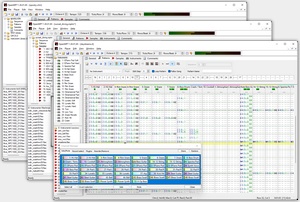OpenMPT 1.25.01.00 released
After four months of development, it's time for the next big OpenMPT release, and OpenMPT 1.25 brings a great bunch of new and improved features.
The biggest change is probably that there is now a third flavour of OpenMPT: The default 32-bit builds are now optimized using the SSE2 instruction set and require Windows 7 or later to run. Older operating systems and CPUs without SSE2 are still supported through a separate build. The 32-bit OpenMPT installer contains both builds and chooses the most suitable one for you. When using the zip package, you will have to pick the correct version on your own. The 64-bit package requires Windows 7 as well, so on 64-bit Windows XP and Vista, it might not work as intended and you will have to resort to using the 32-bit version for now. This might change if a great need for a legacy 64-bit version arises, but we currently doubt that this is the case.
For more information, there is a forum post about the different OpenMPT configurations.
Here is a short summary of the most notable new features:
- In MPTM, IT and XM files, it is now possible to specify the song artist. The default artist can be specified in the settings dialog.
- In MPTM files, the default resampling can now be overridden. The dropdown box in the general tab is also accessible in other formats (so you can quickly change resampling without having to modify your normal playback settings), but won't be saved to the file.
- Decimal tempos (e.g. 123.45 BPM) can now be used in the MPTM format.
- Tempo Shuffle can be used in modern tempo mode to automatically increase or decrease the duration of individual rows of a beat to creat a shuffled / swing rhythm.
- Add Media Foundation (AAC, WMA, ASF, MP1, MP2, MP3, WAV-MSADPCM, ...) sample decoding support on Windows 7 and later.
- It is now possible to export to a sample slot rather than a file.
- Experimental support for 14-bit MIDI controllers in the MIDI Mapper. Combinations of CC 0...31 and CC 32...63 now act as double-precision MIDI messages. I don't have a 14-bit MIDI controller, so if you can test this feature, feedback would be appreciated!
- A default module format or template to use when creating a new module can now be specified in the settings dialog.
- Hidden setting
Misc.AllowMultipleCommandsPerKeycan be used to allow more than one keyboard shortcut being bound to the same key combination (may do unexpected things with existing mappings with overlapping shortcuts such as IT-style "Play Row" on the 8 key, so beware). - In the order list, it is now also possible to just copy the order list pattern numbers instead of their content.
- Added option for smooth (tick-by-tick) pattern scrolling. This is still somewhat experimental and consumes more CPU than necessary at the moment, but should be optimized in the future.
- Apply DNA and NNA settings to live note preview in patterns as well.
- Module instruments are now created automatically for newly added instrument plugins.
- Added hidden setting
VST Plugins.EnableAutoSuspendwhich activates plugin auto-suspension for all plugins (later, this will be configurable per plugin). If a plugin didn't emit any sound during the last four seconds, its sound output is automatically suspended. Mostly useful for bridged plugins to save on process calls. - When using the plugin bridge, MIDI events sent to 64-bit plugins or 64-bit OpenMPT do now work correctly.
- A few more plugins do now work correctly in the plugin bridge.
- Hovering the default and global volume fields in the sample and instrument editor now displays their attenuation in dB. Similarly, hovering the panning field shows its value in a more human-readable form.
- Added dropdown menu to New button for duplicating samples and instruments.
- Letters 'd' and '+' can now be used in note names of custom tunings.
- Instrument random variation is now applied to the velocity of notes sent to instrument plugins.
- Tremor (Ixx) is now also supported for instrument plugins.
For a complete list of changes, have a look at the release notes and the full version history.
We do have a great bunch of interesting new example songs in this release, so go have a look at them in the Help menu!
libopenmpt has been updated as well to reflect the latest improvements in OpenMPT.

